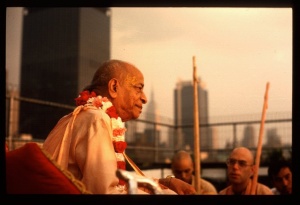CC Madhya 19.106: Difference between revisions
No edit summary |
(Vanibot #0054 edit - transform synonyms into clickable links, which search similar occurrences) |
||
| Line 19: | Line 19: | ||
<div class="synonyms"> | <div class="synonyms"> | ||
''śyāmam'' | ''[//vanipedia.org/wiki/Special:VaniSearch?s=śyāmam&tab=syno_o&ds=1 śyāmam]'' — the form of Śyāmasundara; ''[//vanipedia.org/wiki/Special:VaniSearch?s=eva&tab=syno_o&ds=1 eva]'' — certainly; ''[//vanipedia.org/wiki/Special:VaniSearch?s=param&tab=syno_o&ds=1 param]'' — supreme; ''[//vanipedia.org/wiki/Special:VaniSearch?s=rūpam&tab=syno_o&ds=1 rūpam]'' — form; ''[//vanipedia.org/wiki/Special:VaniSearch?s=purī&tab=syno_o&ds=1 purī]'' — the place; ''[//vanipedia.org/wiki/Special:VaniSearch?s=madhu&tab=syno_o&ds=1 madhu]-[//vanipedia.org/wiki/Special:VaniSearch?s=purī&tab=syno_o&ds=1 purī]'' — Mathurā; ''[//vanipedia.org/wiki/Special:VaniSearch?s=varā&tab=syno_o&ds=1 varā]'' — best; ''[//vanipedia.org/wiki/Special:VaniSearch?s=vayaḥ&tab=syno_o&ds=1 vayaḥ]'' — the age; ''[//vanipedia.org/wiki/Special:VaniSearch?s=kaiśorakam&tab=syno_o&ds=1 kaiśorakam]'' — fresh youth; ''[//vanipedia.org/wiki/Special:VaniSearch?s=dhyeyam&tab=syno_o&ds=1 dhyeyam]'' — always to be meditated on; ''[//vanipedia.org/wiki/Special:VaniSearch?s=ādyaḥ&tab=syno_o&ds=1 ādyaḥ]'' — the original transcendental mellow, or conjugal love; ''[//vanipedia.org/wiki/Special:VaniSearch?s=eva&tab=syno_o&ds=1 eva]'' — certainly; ''[//vanipedia.org/wiki/Special:VaniSearch?s=paraḥ&tab=syno_o&ds=1 paraḥ]'' — the supreme; ''[//vanipedia.org/wiki/Special:VaniSearch?s=rasaḥ&tab=syno_o&ds=1 rasaḥ]'' — mellow. | ||
</div> | </div> | ||
Latest revision as of 22:24, 19 February 2024
Śrī Caitanya-caritāmṛta - Madhya-līlā - Chapter 19: Lord Śrī Caitanya Mahāprabhu Instructs Śrīla Rūpa Gosvāmī

His Divine Grace
A.C. Bhaktivedanta Swami Prabhupada
A.C. Bhaktivedanta Swami Prabhupada
TEXT 106
- śyāmam eva paraṁ rūpaṁ
- purī madhu-purī varā
- vayaḥ kaiśorakaṁ dhyeyam
- ādya eva paro rasaḥ
SYNONYMS
śyāmam — the form of Śyāmasundara; eva — certainly; param — supreme; rūpam — form; purī — the place; madhu-purī — Mathurā; varā — best; vayaḥ — the age; kaiśorakam — fresh youth; dhyeyam — always to be meditated on; ādyaḥ — the original transcendental mellow, or conjugal love; eva — certainly; paraḥ — the supreme; rasaḥ — mellow.
TRANSLATION
“‘The form of Śyāmasundara is the supreme form, the city of Mathurā is the supreme abode, Lord Kṛṣṇa’s fresh youth should always be meditated upon, and the mellow of conjugal love is the supreme mellow.’”
PURPORT
This verse is found in the Padyāvalī (82).